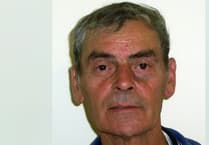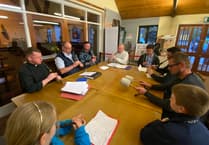A 96-year-old cancer patient is celebrating ten years of being free of the disease after being the first patient to use the Royal Surrey’s Papillon radiotherapy machine.
Bill Prebble, from Haslemere, was referred to the Guildford hospital in 2013 after a bowel cancer diagnosis. The standard treatment would have been to remove the bowel, resulting in a permanent colostomy.
Fortunately, after five weeks of daily radiotherapy, Bill’s tumour had shrunk significantly enough for him to be suitable to receive treatment from the Papillon machine.
Named after a French professor of medicine who first used the treatment in the 1940s, the Papillon machine delivers targeted internal radiotherapy using low-energy X-rays close to a tumour.
It was bought by the trust with support from the BRIGHT and GUTS charities.
Bill’s son Paul said: “We feel so lucky that everything fell into place. It was fortuitous that he was diagnosed in time and was in the right place at the right time.
“The surgeon said it was probably a slow-growing tumour that he had had for a while.
"I think dad might have suspected he had bowel cancer before the diagnosis but had been a bit afraid to see a doctor about it.
“We urged him to see someone about it after going on holiday together and noticing that he rushed to the loo after each meal. It’s something of a reminder that you should check out these things, rather than put them off.
“Dad was extremely positive once he was diagnosed. He said ‘I’ve got it, there’s no point worrying about it. I’m being treated for it and I’m going to remain positive’.
“The staff at Royal Surrey were also amazing. Everyone was so upbeat that they made the experience very manageable.”
After just three sessions of radiotherapy using the Papillon machine, Bill was informed that his tumour had vanished.
Dr Alex Stewart, consultant clinical oncologist, said: “It’s brilliant to hear that Bill, the first patient to use the Papillon machine is doing so well. We are now one of four centres in the UK to use this machine to treat rectal cancer and the only one in the South of England, so we have a wide geographic referral area reaching as far as South Wales, Jersey and even the Bahamas.
“Last year an international randomised trial showed that Papillon helps more patients avoid major rectal surgery than external radiotherapy alone, so our referrals have doubled in the past year.
“With the support of our local charities and the computer science department at Royal Surrey, we have developed an international database for all centres using Papillon and have published two research papers describing the efficacy of the Papillon technique.
“We are also running a clinical trial called the CITRuS study in multiple centres across the country. It uses computers to allow patients to report the effects of colorectal cancer therapy, including Papillon treatment, on their life after treatment finishes, and to develop ways in which we can improve their quality of life."




